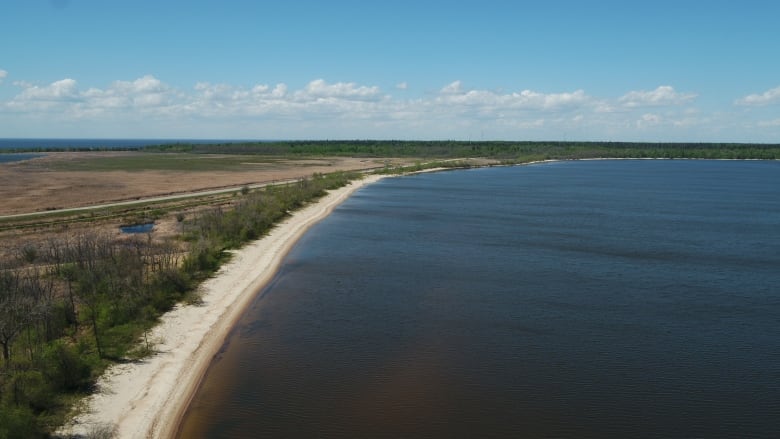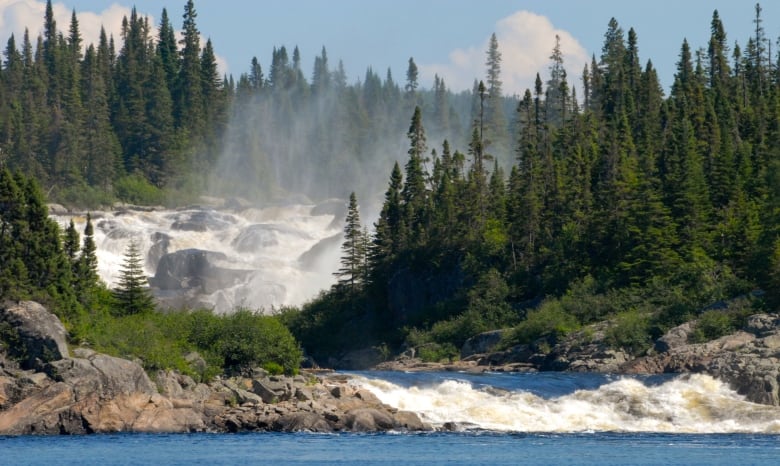
The Southern Chiefs’ Organization says it’s taking Manitoba Hydro and the provincial government to court in a Charter challenge to have Lake Winnipeg given all the rights and protections of a living entity.
“Today, we are making history,” Grand Chief Jerry Daniels said at a news conference Thursday morning.
“We’re not saying this is going to solve everything, but we think this is going to be a good start to changing the way people think about the way the lake’s governed.”
A statement of claim filed Thursday in the Manitoba Court of King’s Bench, with assistance from the Public Interest Law Centre and First Peoples Law in Vancouver, seeks a declaration that Lake Winnipeg has rights to life, liberty and security of the person under Section 7 of the Canadian Charter of Rights and Freedoms.
It alleges the way the Manitoba government and Manitoba Hydro have artificially controlled the water levels and outflow of Lake Winnipeg for decades has been “completely negligent” and had “dire” effects on the lake, Daniels said.
“It is simply irresponsible. Wetlands are in decline. Fish are sick. Invasive species have arrived, and First Nations are denied inherent Indigenous and treaty rights,” he said.
It is becoming increasingly difficult for First Nations to harvest food and traditional medicines in the area, he said.
“Most Manitobans will be stunned to know that in almost 50 years of operation on Lake Winnipeg, Manitoba Hydro has never been required to conduct an environmental assessment to properly analyze the impact of its operations on the lake.”

The Crown corporation generates $3 billion in annual revenue “by using the power of water to control lake levels with man-made infrastructures,” and in 2021 got a licence authorizing those activities to continue on Lake Winnipeg until August 2026, said a Thursday news release from the Southern Chiefs’ Organization, which represents 33 First Nations in southern Manitoba.
Emery Stagg, an Anishinaabe elder from Dauphin River First Nation who has lived on Lake Winnipeg his whole life and is one of the plaintiffs in the court filing, said before the first hydro project started there, he could drink the water and fish, swim and hunt in and near the lake.
“Today, the lake is dying,” Stagg said at the news conference. “It’s sad to see how Lake Winnipeg is being used for the dollar figure. But we need to stand up for our rights.”
The group behind the court filing, which calls itself the Nibi Naa da maa geayuk (the ones who speak for and protect the lake), wants the court to find interference with the natural flows of the lake without environmental assessment has violated the rights of the lake itself and the First Nations citizens who rely on it.
The group is also calling for a public hearing and environmental assessment to consider Manitoba Hydro’s recent application to extend its licence to regulate Lake Winnipeg for up to another 50 years under its existing operating rules, after its current licence expires in 2026.
“Lake Winnipeg must have its own voice in that public hearing,” Bloodvein First Nation Chief Lisa Young said at the news conference.
Grand Chief Daniels said he wants an environmental assessment of the lake to start immediately, with First Nations at the table. The group plans to dispute Manitoba Hydro’s proposed licence extension.
The plaintiffs named in the 27-page court filing also include Anishinaabe elders and knowledge keepers Mary and Robert Maytwayashing, and Taylor Galvin, a knowledge keeper who is also a member of Brokenhead Ojibway nation and director of the Brokenhead Wetland Ecological Reserve.
Similar efforts in Quebec, New Zealand
The group’s bid to have the lake declared a living entity isn’t the first of its kind, Daniels said.
Similar efforts have included the Magpie River in Quebec, which in 2021 was granted legal personhood status to protect it from future threats, including hydro development.
“It’s a kind of a modern way of recognizing that nature matters to us, and that perhaps the traditional Western approach of just seeing land as being there to be exploited needs to shift,” said Michael Coyle, an associate law professor at Western University in Ontario.

While similar environmental protections have been granted in a number of other countries, including for the Whanganui River in New Zealand, Coyle said the court filing in Manitoba strikes him as a “creative” claim because it relies on the Charter.
Similar cases often end up being decided through negotiations, not through court rulings, said Coyle — but sometimes litigation can be used as a way to force those conversations to happen.
While a court could issue a declaration that a lake is a legal person, there are limits to what courts can do, and they often end up recommending parties hammer out the details of how a decision would work in practice on their own, he said.
New rules needed for Hydro: prof
Both Manitoba Hydro and the province declined to comment on the statement of claim while it’s before the court, though the Crown corporation said it complies with all environmental and licensing requirements for its projects.
Patricia Fitzpatrick, a geography professor and instructor with the University of Winnipeg’s master’s program in development practice, said that’s true — but that doesn’t mean an environmental assessment was ever done.
While a 2015 report from the Manitoba Clean Environment Commission recommended the province require that kind of assessment of Lake Winnipeg regulation before relicensing the operation, there was no legal requirement for that to happen.
Fitzpatrick said that means while Hydro is following the rules, those rules were written decades ago and are now “insufficient, given the magnitude of the impact.”
“We need to look at the rules and reconsider our expectations, because the rules are not protecting the environment,” she said.
“We’re seeing meaningful changes in Lake Winnipeg and other aspects of nature which were not envisioned when the legislation was written.”